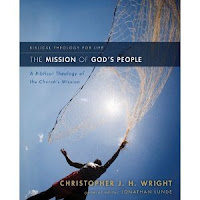We know as Christians our sins are forgiven, we have been "washed in the blood," redeemed from the curse, and born again into new life in Christ. We should also know that's not the end of the story but rather just the beginning. The cross is not only for our redemption but for our reclamation and restoration to what it means to be human. Our fallen state is not an excuse not be human (Romans 1:20) but our inhuman behavior contributes to the mess we make of our world - war, genocide, injustice, systemic poverty, human trafficking, sexual abuse, drug cartels, the slaughter of innocent school children and all manner of evil we do (Romans 1:28-31, 1 Cor 6:9-10). Is it any wonder we often have such a low opinion of "mankind?"
That's not God's design however nor is it what we were created for. The Westminster Confession says that "Man's chief end is to glorify God and enjoy him however." That idea must be at the core of the whole Gospel and inform our thinking for living sent today. It does call us to a duty as humans to live the way we are designed. In fact, now that we are "in Christ" we have a great responsibility to be human. Wright informs us that, "being God's people and therefore already among the new redeemed humanity surely reinforces and intensifies our obligation to live by his original mandate to the human race." And in the beginning God said it was "very good."
I cannot think of any change in our mandate or subjugation of our responsibility to be human we are entitled as Christian, can you? No where in Scripture does it tells us that since we are now born-again our concern in only for the spiritual and we can allow the world to waste away, as long as we make a few converts. Living sent doesn't mean we stand gazing at the sky focused on Jesus return (Acts 1:10-11) but rather to be actively engaged in God's human reclamation project. Jesus calls us to be "salt" and "light" in the world, not only to get people saved, but so that we become fully alive to who we are created to be (2 Timothy 2:21). Salt preserves the imago Dei, the image of God, in which we are made, and Light illuminates the knowledge of God's glory in which we are to live, and move and have our being (Acts 17:28).
We cannot live sent today without at least working on our humanity. Jesus came to us as the perfect man to show us how to live as human. Being Christian doesn't dismiss our duties as humans, nor as we will see our God ordained duties for all humankind. Rather our position in Christ makes it possible to live out those duties as fully human. But first we need to realize, appreciate and apprehend our humanity and what that actually means. Wright quotes Michael Wittmer here:
"To be human is to be in proper relationship with God, other people, and the world. Sin has marred and well-nigh destroyed these relatioship, but in Christ, the perfect person, these are restored...Each of these three relationships is restored as we increasingly grow into the image of Christ. Because Christ is the perfect human, the one person who completely fills out the image of God, the more we become like him, the more human we become...The Christian life, far from transforming us into super-spiritual, quasi-angelic beings, is actually a quest to recover our humanity."Second Century theologian, Irenaeus, one of the earliest Church fathers, famously said,“The glory of God is a human being fully alive; and to be alive consists in beholding God.” When was the last time you heard a sermon on the attributes of being fully alive for the glory of God? Yeah, I can't remember either. What might that even look like? Perhaps a fully alive human, living for the glory of God, looks like the Apostle Paul suggested when he discussed the fruit of the Spirit, a life live in Christ, as exhibiting the following: love, joy, peace, forbearance, kindness, goodness, faithfulness, gentleness and self-control" (Gal 5:22). Those aren't simply Sunday School lessons for children. Those are qualities we need, I know I need, for living sent today.
Q - What does it mean to be human?



